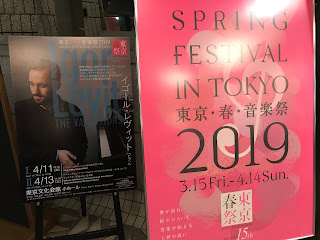Igor Levit at Tokyo Bunka Kaikan Recital Hall, April 11th 2019
This year’s Tokyo Spring Festival, an annual event that takes place during the cherry blossoms season and programs classical music concerts in venues around Ueno Park, invited Igor Levit, one of the leading current masters of the keyboard. The program titled Variations reproduced the track list of his 2015 triple CD. It was divided in two days, the second one showcasing Beethoven’s Diabelli Variations and Rzewski’s variations on The People United Will Never Be Defeated. An electrifying performance of the Goldberg Variations by Johann Sebastian Bach was in order for the first day. I was there for the first concert.
Joined by a page turner, Levit walked on stage wearing one of those oversized white shirts that you imagine people in the 18th century wore underneath their jackets. He sat on his stool and proceeded to deliver a moving rendition of the initial Aria. In the first 15 variations a contrast between fast and slow movements seems to be more clearly demarcated, usually alternating them. This being my first time witnessing the Goldberg Variations in concert, I was in awe with the virtuosity displayed in the faster movements. Originally written for the doubled-keyboard harpsichord, when played on a piano this pieces require a certain amount of hand crossing, among other intricate techniques. Levit shined in this fast passages and showed his mastery with his reading of the slower ones.
He would extend the tempos emphasizing tension, especially in the 13th variation, in which the slightly syncopated pulse felt almost like jazz. The 15th one, a canon which is said to be a sort of a distorted mirror, with the left hand almost arguing with the right one, was another soulful rendition, a journey that ended with both hands as far apart from each other as possible. At this point Levit took a 15-20 seconds break before embarking on the second half with those majestic opening chords of the 16th variation.
In the second half the contrast of moods between variations is less noticeable. Extreme technical dexterity is the name of the game in this last half, and even though it looked effortless, you could tell by Levit’s body language that it requires extreme concentration. Make no mistake, the man is no Glenn Gould or Keith Jarrett, both among my favorites but notorious for their unusual antics while playing. You won’t hear Levit grunting or loudly accompanying melodies with his voice. But from time to time he would extend a leg and stomp, or will conduct with his right hand while is not playing. In his facial expression you’ll see reflected the satisfaction of being able to translate this transcendent message written hundreds of years ago.
In the receiving end there’s empathy. From the somberness of the 25th variation to the joy of the almost choir-like 30th. The ups and downs, the mood shifts, even the title: “variations”, reflect life. I think it’s impossible not be moved by the Da Capo at the end that note by note repeats the first Aria. We hear it this time with all the knowledge of the previous passages like a life being recapitulated at its end. This cyclic journey, a reflection on human existence, is nostalgic and powerful; Igor Levit was the best vessel to convey it. Written over 250 years ago for a single keyboard instrument, its eloquence is still unparalleled. Witnessing an artist of this caliber with the acoustics of one of the best concert halls in Japan, delivering such a striking rendition of a masterpiece was truly a sublime experience.
Thank you for reading. Please follow me on Twitter for updates at @ConcertTokyo. You can also click the Like button and get notifications at The Tokyo Concert Experience on Facebook.





Comments
Post a Comment